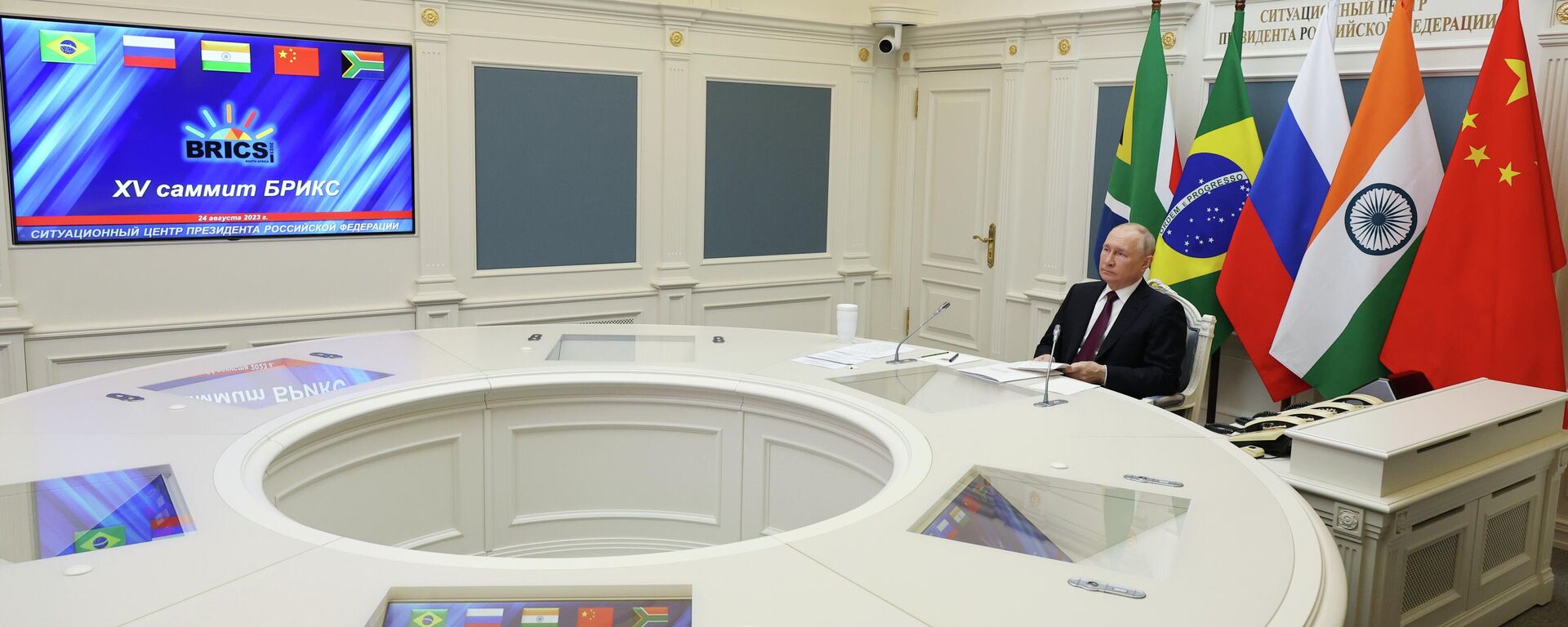https://sputniknews.in/20240619/dedollarisation-economic-diversification-attract-malaysia-to-brics-7654465.html
Dedollarisation, Economic Diversification Attract Malaysia to BRICS
Dedollarisation, Economic Diversification Attract Malaysia to BRICS
Sputnik India
The need for bolstering economic relationships with other developing countries and a reduced dependence on US Dollar (USD) are major factors behind Malaysia's decision to join the BRICS grouping, experts have told Sputnik India.
2024-06-19T12:37+0530
2024-06-19T12:37+0530
2024-06-19T13:04+0530
business & economy
brics
malaysia
us
china
global south
brics currency
brics expansion
2023 brics summit
world trade organization (wto)
https://cdn1.img.sputniknews.in/img/07e7/08/19/3829845_0:0:1280:720_1920x0_80_0_0_504bdfaaeae9060330b72bd6a98384ce.png
The need for bolstering economic relationships with other developing countries and a reduced dependence on US Dollar (USD) are major factors behind Malaysia's choice to become a member of the BRICS, experts have told Sputnik India.Meanwhike, he recalled that Anwar had clearly stated last year that he intended on shedding reliance on US Dollar amid a growing global trend of de-dollarisation.The Malaysian economist said that Anwar has even revived support for the idea of having an Asian Monetary Fund (AMF), a proposed regional rival to the International Monetary Fund (IMF).According to official statistics, the US holds the largest stock of foreign investment into Malaysia being its close economic and defence partner. Malaysia is also one of the founding members of US-led Indo-Pacific Economic Framework (IPEF), a trade grouping formed to rival China's growing influence.Beijing, meanwhile, has consistently ranked the country's biggest trading partner since 2009.The think-tanker stated that the larger geoeconomics objective of Anwar was to change the dynamic between the US-led West and the developing nations."Malaysia wants to be catalytic in influencing the direction of this process," Nambiar remarked.Economic DiversificationDr. Zokhri Idris, a Malaysia's foreign policy expert, told Sputnik India that Anwar Ibrahim's government had been orienting the country's foreign policies to be "pragmatic" to sustain the country's "survival".He stressed that the country enjoyed significant trading relationships with several BRICS members.In this light, Idris highlighted that Malaysia-Brazil trade had increased by nearly 20% between 2020 and 2022, while commerce volumes with India stood at nearly $20 billion in 2022-23 and China was already its biggest trading partner.The expert further claimed that a prospective BRICS membership could possibly translate into enhanced economic ties with other group's states. The country needs more countries – via multilateral set up like the intergovernmental organisation – to leverage its products offering, he added.
https://sputniknews.in/20230824/brics-stands-for-truly-balanced-world-order-president-putin-3803742.html
malaysia
us
china
global south
russia
india
asean
saudi arabia
africa
middle east
Sputnik India
feedback.hindi@sputniknews.com
+74956456601
MIA „Rossiya Segodnya“
2024
Dhairya Maheshwari
https://cdn1.img.sputniknews.in/img/07e6/0c/13/138962_0:0:641:640_100x100_80_0_0_2cb44360dbcdf6d84bf4b299cd045917.jpg
Dhairya Maheshwari
https://cdn1.img.sputniknews.in/img/07e6/0c/13/138962_0:0:641:640_100x100_80_0_0_2cb44360dbcdf6d84bf4b299cd045917.jpg
News
en_IN
Sputnik India
feedback.hindi@sputniknews.com
+74956456601
MIA „Rossiya Segodnya“
Sputnik India
feedback.hindi@sputniknews.com
+74956456601
MIA „Rossiya Segodnya“
Dhairya Maheshwari
https://cdn1.img.sputniknews.in/img/07e6/0c/13/138962_0:0:641:640_100x100_80_0_0_2cb44360dbcdf6d84bf4b299cd045917.jpg
malaysia brics, brics summit, brics news, brics expansion, brics dedollarisation, dedollarisation news, asean news, brics countries, global south, asian monetary fund, malaysia news, malaysia china trade
malaysia brics, brics summit, brics news, brics expansion, brics dedollarisation, dedollarisation news, asean news, brics countries, global south, asian monetary fund, malaysia news, malaysia china trade
Dedollarisation, Economic Diversification Attract Malaysia to BRICS
12:37 19.06.2024 (Updated: 13:04 19.06.2024) Malaysia would soon begin the process of joining the BRICS grouping, Prime Minister Anwar Ibrahim told a Chinese publication Guancha this week. Earlier, Thailand also expressed a formal interest in joining the Global South grouping.
The need for bolstering economic relationships with other developing countries and a reduced dependence on US Dollar (USD) are major factors behind Malaysia's choice to become a member of the BRICS, experts have told Sputnik India.
"Malaysia has decided that it wants to be on the side of other fast developing economies; it wants to be a part of the group that will set the narrative for the next 50 years. The global economy has for long been a part of the dominant narrative and PM Anwar clearly thinks that it is about time to review alternative models," Dr. Shankaran Nambiar, Head of Research at Malaysian Institute of Economic Research (MIER) commented.
Meanwhike, he recalled that Anwar had clearly stated last year that he intended on
shedding reliance on US Dollar amid a growing global trend of de-dollarisation.
The Malaysian economist said that Anwar has even revived support for the idea of having an Asian Monetary Fund (AMF), a proposed regional rival to the International Monetary Fund (IMF).
According to official statistics, the US holds the largest stock of foreign investment into Malaysia being its close economic and defence partner. Malaysia is also one of the founding members of US-led Indo-Pacific Economic Framework (IPEF), a trade grouping formed to rival China's growing influence.
Beijing, meanwhile, has consistently ranked the country's biggest trading partner since 2009.
"Managing the balancing act is the tricky part. But I think that it could be negotiated. Malaysia has always had extremely good relations with the US and this can be expected to continue in various areas, including defence," Nambiar explained.
The think-tanker stated that the larger geoeconomics objective of Anwar was to
change the dynamic between the US-led West and the developing nations.
"Malaysia wants to be catalytic in influencing the direction of this process," Nambiar remarked.
Dr. Zokhri Idris, a Malaysia's foreign policy expert, told Sputnik India that Anwar Ibrahim's government had been orienting the country's foreign policies to be "pragmatic" to sustain the country's "survival".
"The focus of Malaysia's survival lies in boosting its economic prospects, due to an average growth for its post-pandemic recovery," Dr. Idris said.
He stressed that the country enjoyed significant trading relationships with several BRICS members.
In this light, Idris highlighted that Malaysia-Brazil trade had increased by nearly 20% between 2020 and 2022, while commerce volumes with India stood at nearly $20 billion in 2022-23 and China was already its biggest trading partner.
"Malaysia has not exhausted its potential with Russia and South Africa, which are among the reasons that motivates Malaysia to join," he remarked.
The expert further claimed that a prospective BRICS membership could possibly translate into
enhanced economic ties with other group's states. The country needs more countries – via multilateral set up like the intergovernmental organisation – to leverage its products offering, he added.
"Malaysia also sees this as an opportunity to expand its economic outreach in the Middle East when Ethiopia, Saudi Arabia, Egypt, UAE, and Iran officially join in 2024. Malaysia aspires to be a global player in semiconductor production and Halal products and supply chain," Idris concluded.



